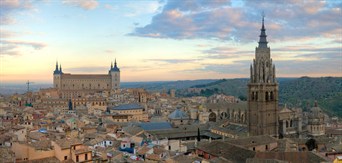Toledo
 The ancient capital of the Visigoth kingdom, Toledo was subjected to Muslim rule in 711. Regained by Christian forces in the eleventh century, it became a thriving economic and cultural centre. The successful synthesis between Christian, Arabic and Hebrew culture, it began to wane with the expulsion of the Jews decreed in 1492. Enlarged and embellished at the behest of the Catholic Monarchs, the city hosted the ceremony of proclamation of Philip I “the Fair” (1478-1506) and Joanna “the Mad” (1479-1555) as the heirs of the Crown of Castile (1502). After participating in the Revolt of the comuneros (1520-21) against the power of the young King Charles I (Emperor Charles V, 1500-1558), it became one of the most important cities of the Habsburg Empire, the seat of one of the most powerful aristocratic families of modern age Spain, the Álvarez de Toledo. With the final transfer of the court in Madrid decided by Philip II (1527-1598), and with the destruction of the textile industry, the city lost political influence and entered a period of economic recession that lasted, as in all of Castile, also in the seventeenth century.
The ancient capital of the Visigoth kingdom, Toledo was subjected to Muslim rule in 711. Regained by Christian forces in the eleventh century, it became a thriving economic and cultural centre. The successful synthesis between Christian, Arabic and Hebrew culture, it began to wane with the expulsion of the Jews decreed in 1492. Enlarged and embellished at the behest of the Catholic Monarchs, the city hosted the ceremony of proclamation of Philip I “the Fair” (1478-1506) and Joanna “the Mad” (1479-1555) as the heirs of the Crown of Castile (1502). After participating in the Revolt of the comuneros (1520-21) against the power of the young King Charles I (Emperor Charles V, 1500-1558), it became one of the most important cities of the Habsburg Empire, the seat of one of the most powerful aristocratic families of modern age Spain, the Álvarez de Toledo. With the final transfer of the court in Madrid decided by Philip II (1527-1598), and with the destruction of the textile industry, the city lost political influence and entered a period of economic recession that lasted, as in all of Castile, also in the seventeenth century.
